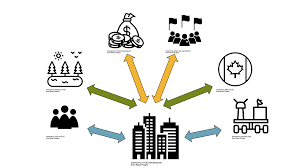Do you ever wonder about the factors that shape our world?
In this article, you’ll explore the external forces that have a profound impact on our lives. From economic factors and political influences to technological advancements and cultural shifts, these external forces shape our society and provoke change.
By understanding these influences beyond the system, you’ll gain a deeper understanding of the world we live in and how to navigate its complexities.
So, let’s dive in and explore the forces that shape our reality.
Economic Factors: Impact and Implications
You should consider the economic factors’ impact and implications on your business strategy.
The economy plays a crucial role in shaping the success of your business. Changes in economic conditions can have a direct impact on your sales, revenue, and profitability.
For example, during a recession, consumer spending tends to decrease, which can lead to a decline in demand for your products or services. This may require you to adjust your pricing strategy or explore new markets.
Additionally, inflation can affect your costs of production, leading to higher expenses and potentially lower profit margins.
Understanding these economic factors and their implications allows you to make informed decisions and develop strategies that can help your business thrive, even in challenging economic times.
Political Influences: Navigating Power Dynamics
There are several political influences that can impact power dynamics and shape the course of decision-making. As an individual navigating through the complex landscape of politics, it’s important to understand these influences in order to make informed choices.
Political parties, for example, play a significant role in shaping the power dynamics within a system. Their ideologies and policies can sway public opinion and determine the course of action taken by those in power.
Lobbying groups also exert influence by advocating for specific interests and pushing for their agendas to be prioritized.
Additionally, the media has the power to shape public perception and influence political outcomes through its coverage and portrayal of events.
Understanding how these political influences operate is crucial in order to navigate power dynamics effectively and ensure that decision-making processes are fair and transparent.
Technological Advancements: Catalysts for Change
Technology has revolutionized communication and transportation, allowing for greater connectivity and efficiency. In today’s fast-paced world, technological advancements have become catalysts for change, shaping the way we live, work, and interact with one another.
From smartphones to social media platforms, technology has made it easier than ever to connect with people from all around the globe. With just a few taps on a screen, you can send a message, make a video call, or share important information instantaneously.
Additionally, transportation has been greatly improved by technology, with the development of faster and more efficient modes of travel. Whether it’s airplanes, high-speed trains, or electric cars, technology has made it possible for us to reach our destinations quicker and more conveniently.
The impact of technology on communication and transportation can’t be overstated, as it continues to shape our world and drive us towards a more connected and efficient future.
Cultural Shifts: Adapting to Evolving Norms
In today’s rapidly changing world, cultural shifts are constantly occurring, and it’s important to adapt to these evolving norms. Society is dynamic, and understanding cultural shifts is crucial for personal growth and social harmony.
By recognizing and embracing these changes, you can effectively navigate through the complexities of a diverse and interconnected world. Cultural shifts can affect various aspects of our lives, including language, fashion, social norms, and values.
Adapting to evolving norms allows you to foster inclusivity, empathy, and respect for different perspectives. It also enables you to thrive in diverse environments and build meaningful connections with people from various backgrounds.
Embracing cultural shifts isn’t about abandoning your own identity, but rather, it’s about being open-minded and willing to learn from others. So, stay curious, engage in meaningful conversations, and embrace the beauty of our ever-changing cultural landscape.
Environmental Forces: Sustainability and Resilience
You can contribute to environmental sustainability and resilience by actively engaging in conservation efforts and supporting renewable energy initiatives.
By participating in activities such as recycling, reducing water consumption, and minimizing energy wastage, you play a crucial role in preserving our planet for future generations.
Additionally, supporting renewable energy sources like solar and wind power helps reduce reliance on fossil fuels, which contribute to greenhouse gas emissions and climate change.
Transitioning to cleaner energy alternatives not only helps protect the environment but also promotes economic growth and job creation in the renewable energy sector.
By making conscious choices in your daily life and advocating for sustainable practices, you become part of a global movement towards a greener, more resilient future.
Together, we can make a difference and ensure a sustainable planet for all.
Conclusion
In conclusion, understanding and navigating external forces is crucial for individuals and organizations to thrive in today’s complex world.
Economic factors, political influences, technological advancements, cultural shifts, and environmental forces all shape our lives and impact our systems.
By staying aware of these influences and adapting to them, we can build resilience, sustainability, and success in the face of constant change.
So, embrace the challenges and seize the opportunities brought by these external forces to shape a better future.


